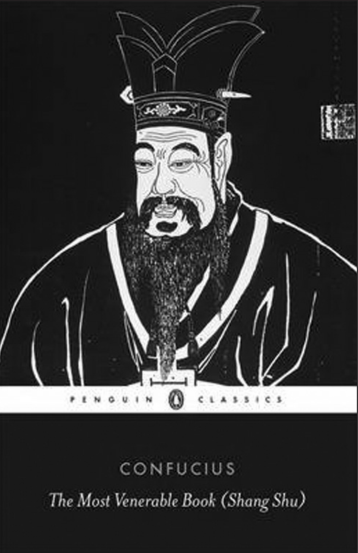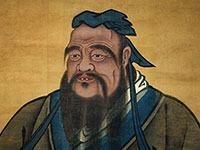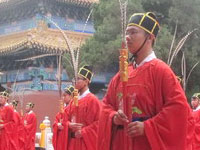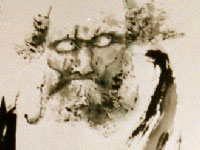 |
|
Shang Shu is one of the five classic manuals of Chinese administration.
|
The first Chinese emperor, Qin Shi Huang, continues to fascinate, most recently for television viewers in Britain through Andrew Graham-Dixon's The Art of China (BBC). Qin's terracotta army in Xi'an attracts tourists by the busload. What is lesser known is his decree ordering the destruction of all books except those covering medicine, war, divination or agriculture. He wanted people to believe that no values or ideas had existed before he seized power in 221 BC-a kind of year zero.
At the top of his hit list was Shang Shu, but it survived at least in part and is the topic of a new translation by Martin Palmer.
It is one of the five classic manuals of Chinese administration and has benefited from its connection with Confucius, who is no longer thought to have edited the text but did comment on it.
To Confucius, the ideal state for the individual was that of the sage, but since that was difficult to attain, he created the notion of junzi, usually translated as gentleman. That was based on his reading of ancient texts such as Shang Shu.
The five texts were central to the Chinese Imperial Examinations system, which was abolished in 1905.
Reading it today benefits anyone who seeks to understand the traditions that underpin the way that China is run.
Shang Shu is a guide to the evolving leadership styles in China over many centuries. Palmer has provided what the book blurb calls a "fluid" translation, and it certainly reads well.
We also get a clear, comprehensive introduction that adds life and meaning to the text. He goes through its history and its rediscovery in a style that is rigorous without being dry.
More than that, Palmer is our guide as we read the text, with brief notes atop many chapters.
The 256-page volume ends with a guide to the personalities of the book.
Some sections have been reworked as poetry by collaborator Jay Ramsay, reflecting the rhythm of elements of the original text.
Additionally, chapters take various styles of writing including announcements, speeches, chronicles and instructions. That sounds bureaucratic, but the text is alive with the deeds and misdeeds of Chinese rulers, some told in graphic and gory detail.
Shang Shu is divided into four sections reflecting traditional eras of Chinese history, the Yu, Xia, Shang and Zhou, covering the best part of two millennia from 2357 BC but with long gaps.
In the Book of Xia, the Covenant at Gan is a rallying cry from a king to his warriors before going into battle. "Do as you are expected and you will be honored in front of the ancestors." All very Henry V.
Regime change strikes in the Book of Shang, where, in Chapter 10, we are told: "But it is Heaven that has decreed that the ruler of Xia must be executed because of all his many crimes." We are left in no doubt as to why. "Let's be frank; the ruler of Xia lost sight of what is virtuous. As a result, the people were living in a state of great fear."
The Book of Zhou is the longest, and chapters 27 to 29 are an account by King Wu of the Zhou of how he was commanded by heaven to overthrow Zhou, the Shang ruler. Zhou's barbarity is well known in China and his crimes are referred to in the text: "Listen: He dissected the bare legs of those who work deep in the paddy fields and cut out for casual inspection the hearts of the highest men!"
This is rather terse, but Palmer is on hand to explain the grim legend. We will spare you the details.
Some of the book has clearer and more direct references to problems that resonate in China today. Chapter 38, for example, rails against officials misusing funds to get drunk. President Xi Jinping has made similar pleas against wastefulness.
It was important to the ancients that order be maintained in the cosmos, and Chapter 32, the Great Plan, outlines some core elements of Chinese philosophy dating back at least 2,000 years.
It has Five Elements, Eight Regulations, Five Conducts and advocates "careful use of the Five Good Fortunes with a respect for the Six Extremes". Naturally.
Palmer's favorite is the Exploration of Uncertainty. "When it comes to appointing good people, three people should be consulted and follow any two who agree."
The themes range from the prosaic ("Just do what is right and proper and all with be well") to extraordinary detail about punishments and funeral rituals, and the bizarre ("... those very strange foreigners who, for example, button their coats on the left side ...").
There has been a revival in interest in China in Confucian ethics in recent years as people search for moral points of reference.
Shang Shu is part of this, and Palmer has presented the English-reading audience with an excellent route to an understanding of these ideas.
We Recommend:

|

|

|
|
How Confucianism shaped China
|
Ritual marks 2,565th birthday of Confucius
|
Zen Buddhist paintings on display in Beijing
|
